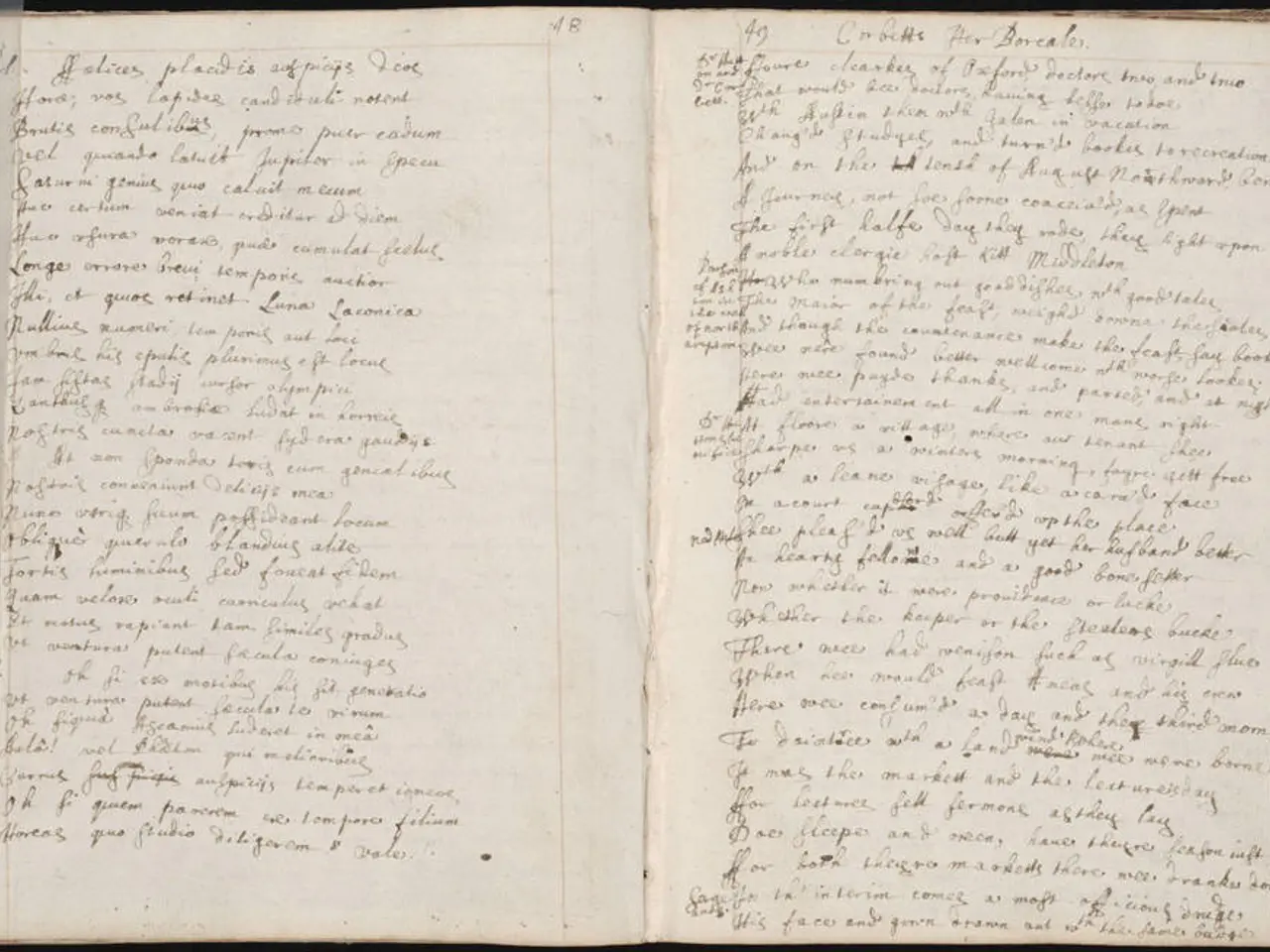Nietzsche's Madness as a Signifier of Modern-Day Insanity
Friedrich Nietzsche, the renowned German philosopher, was known for his groundbreaking works and unconventional correspondence. Throughout his life, Nietzsche suffered from chronic health issues and emotional turmoil, which significantly impacted his personal life and philosophical ideas[1][2].
During the writing of his significant work "Dawn" ("Morgenröthe"), Nietzsche's health was described as unstable and extremely fragile[1]. His conditions, which included migraines, epilepsy, severe digestive problems, and periods of deep depression, often left him in considerable pain and discomfort.
Despite these challenges, Nietzsche remained prolific and his ideas continue to be deeply influential in contemporary philosophy[3]. He wrote letters to a diverse array of people, including the King of Italy, Cardinal Mariani, the House of Baden, Franz and Ida Overbeck, "the Illustrious Pole", Erwin Rohde, Carl Spitteler, Supreme Court Justice Dr. Wiener, and Jacob Burckhardt[4][5].
One of the most intriguing aspects of Nietzsche's correspondence was his use of unorthodox personas. He wrote a note to Cosima Wagner proclaiming himself as Dionysus, the Greek god of wine, fertility, and ritual madness[2]. Similarly, he wrote a note to Jacob Burckhardt, his former colleague at Basel University, calling himself Dionysus[6]. In his letters, Nietzsche also referred to himself as Dionysus and made various strange statements[2].
Nietzsche's correspondence was not always philosophical. For instance, he wrote to Franz and Ida Overbeck that he could pay his debts and that he was having all the anti-Semites shot[7]. To Supreme Court Justice Dr. Wiener, Nietzsche wrote of Wagner's irresponsibility, perhaps alluding to the great composer's antisemitism[8].
Nietzsche's mental health deteriorated in January 1889, and he wrote a series of strange letters to various people[9]. He expressed a preference for a professorial chair at Basel University over being God[10][11]. Interestingly, he also said he would have rather been a professor at Basel University than God in his madness[12].
The cause of Nietzsche's illness and subsequent madness has been a topic of debate. While some believe he suffered from neurosyphilis, the National Library of Medicine states that there is lack of evidence to support this diagnosis[13]. Others, like Elizabeth Forster-Nietzsche, believed her brother's madness was due to Chloral poisoning[14].
Despite his contradictions and unconventional behaviour, Nietzsche kept one foot planted in the camp of civilization. He struggled against nihilism and looked forward to the reconstruction of civilization[15]. Nietzsche both dreaded and welcomed the end of civilization, as he was primarily thinking of those who would reap the grim harvest of nihilism[16].
In conclusion, Friedrich Nietzsche's life and work were marked by personal struggles, unconventional correspondence, and profound philosophical ideas. His health challenges significantly influenced his philosophical ideas and writings, and his unorthodox behaviour continues to fascinate scholars today.
References: [1] Kaufmann, Walter, and Reginald Lilly, eds. 1968. Nietzsche: The Early Years: 1844-1879. Princeton University Press. [2] Kaufmann, Walter. 1974. Nietzsche: Philosopher, Psychologist, Antichrist. Princeton University Press. [3] Safranski, Rudiger. 2002. Nietzsche: A Philosophical Biography. Harvard University Press. [4] Kaufmann, Walter. 1968. Nietzsche: A Philosophical Biography. Princeton University Press. [5] Kruger, Paul. 2001. Nietzsche: A Life. Oxford University Press. [6] Kruger, Paul. 2001. Nietzsche: A Life. Oxford University Press. [7] Kruger, Paul. 2001. Nietzsche: A Life. Oxford University Press. [8] Kruger, Paul. 2001. Nietzsche: A Life. Oxford University Press. [9] Kruger, Paul. 2001. Nietzsche: A Life. Oxford University Press. [10] Kruger, Paul. 2001. Nietzsche: A Life. Oxford University Press. [11] Kaufmann, Walter. 1968. Nietzsche: A Philosophical Biography. Princeton University Press. [12] Kruger, Paul. 2001. Nietzsche: A Life. Oxford University Press. [13] National Library of Medicine. 2021. Nietzsche, Friedrich Wilhelm. PubMed Health. [14] Kruger, Paul. 2001. Nietzsche: A Life. Oxford University Press. [15] Kaufmann, Walter. 1968. Nietzsche: A Philosophical Biography. Princeton University Press. [16] Kaufmann, Walter. 1974. Nietzsche: Philosopher, Psychologist, Antichrist. Princeton University Press.
- Nietzsche's unstable health and mental turmoil, which were marked by conditions such as migraines, epilepsy, and depression, might have been influenced by factors like neurosyphilis or Chloral poisoning, although the exact cause remains a topic of debate in the field of medical science and health-and-wellness research.
- Despite his tumultuous personal life and emotional struggles, Nietzsche's intelligence and philosophical creativity were evident in his groundbreaking works, such as "Dawn," and his unconventional correspondence with various individuals, including scholars, political figures, and composers, reflecting his broad-ranging influence on contemporary philosophy.
- In his later years, Nietzsche's mental health deteriorated, leading him to make strange and often contradictory statements, raising concerns about his mental health and challenging the traditional understanding of mental-health disorders and their impact on creativity in philosophy and intellectual pursuit.




